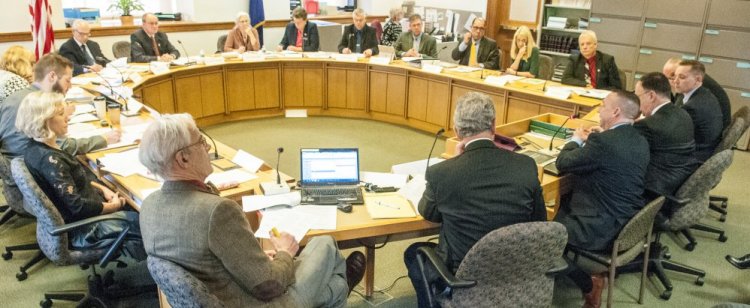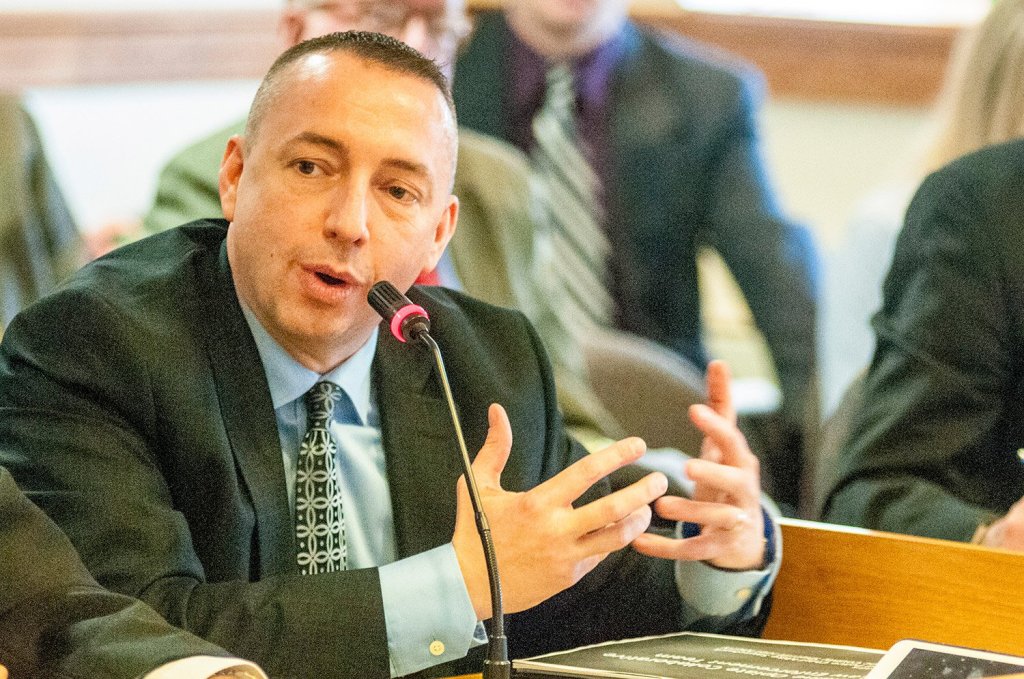AUGUSTA — A task force to study Maine’s heroin crisis met for the first time on Friday as legislators, treatment providers and law enforcement officials address a problem that killed nearly one Mainer a day last year.
And in one of its very first actions, the newly formed commission reviewed dozens of recommendations from an earlier opioid commission – recommendations issued just 11 months ago.
The challenge facing the “Task Force to Address the Opioid Crisis in the State” will be to try to catch up to – much less somehow get ahead of – a drug epidemic that continues to ravage communities throughout Maine. Earlier this week, first responders in Portland administered the lifesaving drug Narcan to five opioid overdose victims in a 24-hour period. And addiction specialists say demand for drug treatment – particularly residential treatment and medication-assisted treatment – far outstrips availability in the state.
Sen. Andre Cushing, R-Hampden, said the task force “will build upon what we learned” from the earlier commission, identify actions that have been taken since last year and recommend next steps to the Legislature. Simply throwing more money at the issue will not work or gain traction with some in the Legislature.
“It’s more complex than that,” Cushing said.
A record 378 Mainers died of drug overdoses in 2016, with 313 of those overdosing on heroin, fentanyl and prescription opiates. While opiate addiction is a problem nationwide, the crisis has been more acute in Maine than nearly anywhere else in the country, as detailed in a recent 10-part Portland Press Herald series titled “Lost: Heroin’s Killer Grip on Maine’s People.”
From 2013 to 2014, Maine recorded the nation’s third-highest increase in overdose deaths – a surge of 27 percent. In 2015, Maine trailed only New Hampshire, North Dakota and Massachusetts in terms of the rate of increase in overdose deaths.
The task force that convened on Friday – which includes a mix of lawmakers, treatment specialists and law enforcement officials – has just one more meeting before it must submit an initial report to the Legislature recommending legislation. A final report proposing additional legislation for the 2018 session is due in December.
Last May, three task forces working collectively as the “Maine Opiate Collaborative” issued nearly 40 recommendations on combating the heroin and opiate crisis in the state. Those recommendations ranged from specific initiatives – such as expanded drug treatment courts and allowing prescriptions of generic Suboxone under MaineCare – to longer-term goals such as destigmatizing substance use disorders and enhancing drug prevention programs.
Nearly 40 people representing the medical community, drug treatment programs and law enforcement agencies served in the collaborative, which was headed by former U.S. Attorney Thomas E. Delahanty II, Attorney General Janet Mills and Department of Public Safety Commissioner John Morris. Those recommendations were based, in part, on roughly two dozen community forums held around the state.
“None of us would feel bad if you just ripped the front page off of this and put your title on there and said that this is how we are going to move forward,’” Portland Police Chief Michael Sauschuck, who co-chaired the law enforcement group, said while holding a copy of the collaborative’s report. “Because a lot people put a lot of incredible time and energy into that collaborative process and the recommendations that are before you.”
Sauschuck recapped some of the ways police departments statewide are attempting to deal with the rising addiction rates, such as the Scarborough Police Department’s “Operation Hope,” which helps place drug users in treatment programs elsewhere, oftentimes in other states. He also that the Maine Criminal Justice Academy and departments are working to destigmatize addiction in officers’ eyes by exposing them to people in long-term recovery, family members affected by addiction and treatment specialists.
A PLEA FOR TREATMENT
Asked for the top item on his “wish list” for fighting the opioid crisis, Sauschuck answered, “Medicaid expansion,” because so many people grappling with addiction lack insurance to access treatment.
“It’s funny, as a cop sitting here, I’m not going to tell you that I need more drug agents. I’m going to tell you I need more treatment and I need more prevention work,” Sauschuck said. “If we’re not doing prevention, treatment and enforcement – and we’re not doing them equally – then we will fail and we are going to continue to fail. And when we fail in this conversation, people are dying. A person is going to die today, tomorrow and every day moving forward, (that) is what the stats show.”
That response is guaranteed to be unpopular with some in the State House – most notably Gov. Paul LePage, who has vetoed several Medicaid expansion bills.
Several members who served on both the previous “collaborative” and the current task force said they hope this latest effort will shed more light on how much money is being spent on treatment in Maine and where that money is being spent.
“That was asked by all of the groups who did the work previously, and I am sure it is very difficult to get,” said Dr. Steven Diaz, chief medical officer at MaineGeneral Health in Augusta. “But that is how you direct legislation to approach the problem more dynamically. MAT (medication-assisted treatment) along with counseling … is the way to turn this around. But you can’t have an open checkbook without some accountability.”
Ross Hicks, who works on overdose prevention and addiction issues at the Health Equity Alliance, added that he would like to know how much federal money is available and how much, if any, Maine is “leaving on the table.”
A Republican leader in the House, Assistant Minority Leader Ellie Espling of New Gloucester, had originally proposed creating a special legislative committee charged with reviewing bills related to the current drug crisis. A similar committee was created to review the slew of marijuana-related bills introduced after voters legalized recreational marijuana last November. But instead of Espling’s proposed committee, legislative leaders created the task force charged with making additional recommendations to the Legislature by year’s end.
The change drew a lukewarm endorsement from Espling at the time.
“I’m pleased to see the Legislature taking this step to review how we are addressing this crisis from a public policy perspective,” she said in a Feb. 16 statement. “However, I have said in the past and I still believe this is an issue that demands our immediate attention and I remain hopeful that the Legislature can take the time to act this session to thoroughly vet all the bills related to this epidemic and implement a comprehensive approach that incorporates enforcement, treatment and education.”
The task force’s next meeting is scheduled for April 21.
Send questions/comments to the editors.




